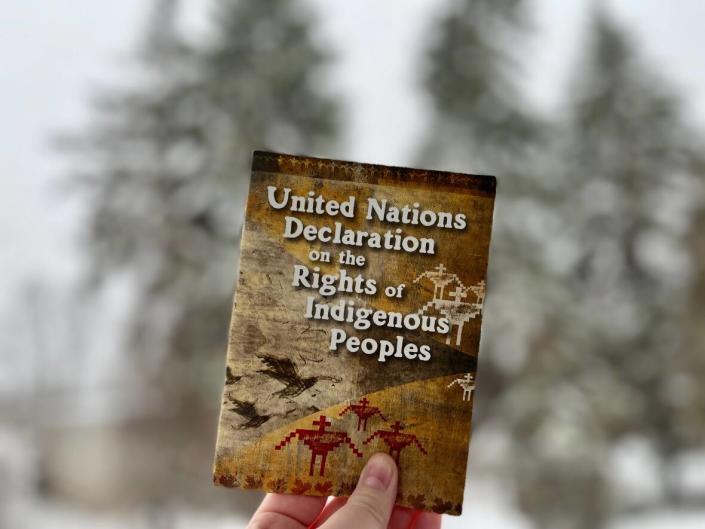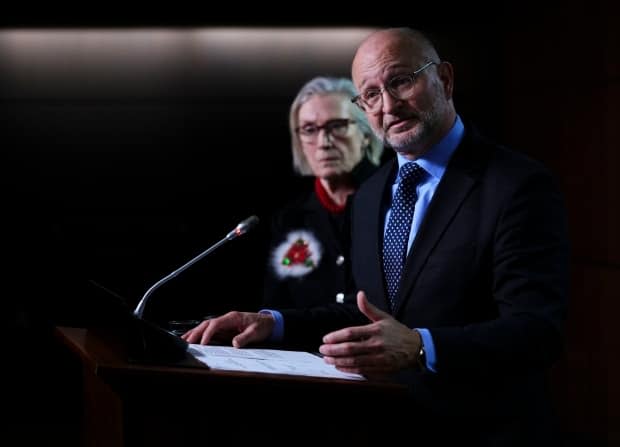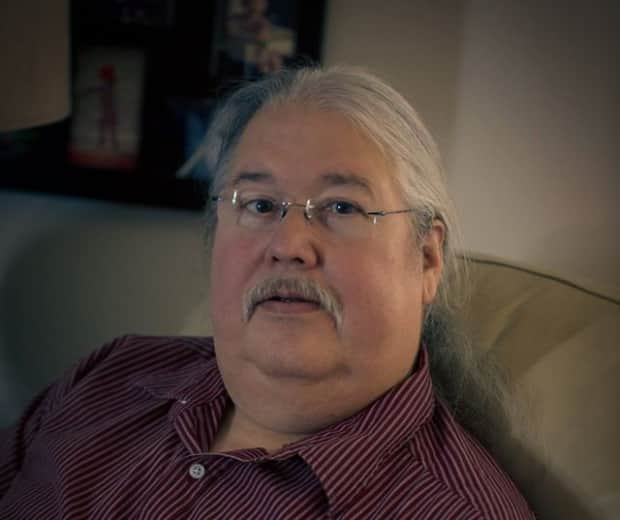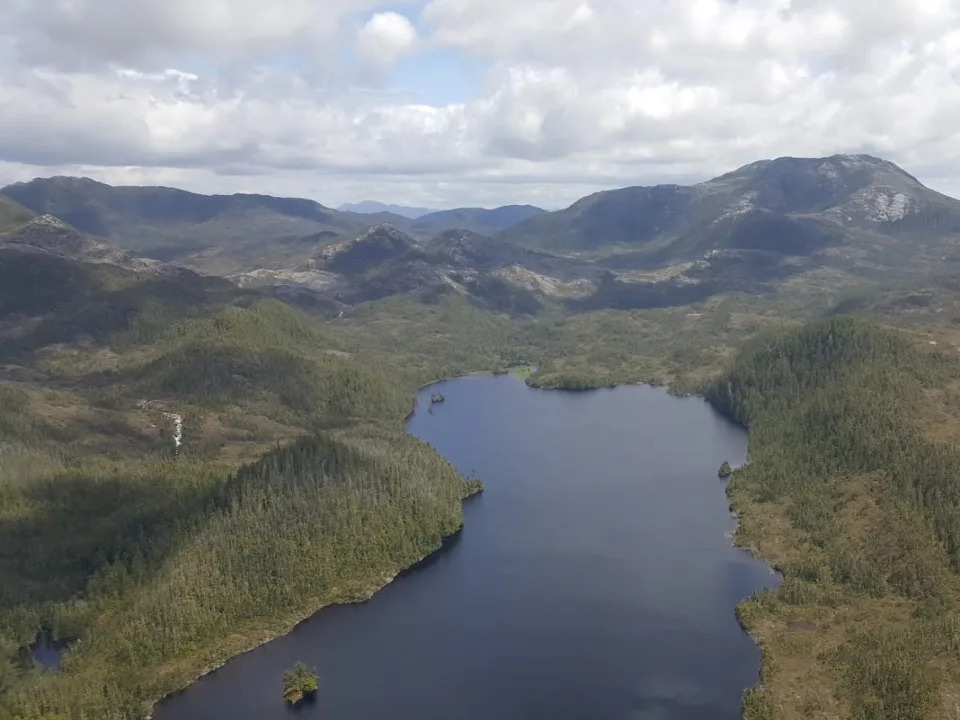Mon, April 3, 2023

The United Nations Declaration on the Rights of Indigenous Peoples contains 26 articles affirming inherent and pre-existing collective rights and human rights of Indigenous peoples. (Ka’nhehsí:io Deer/CBC - image credit)
As the Trudeau Liberals approach eight years in power, David Lametti acknowledges much is riding on his government's upcoming plan to implement the United Nations Declaration on the Rights of Indigenous Peoples (UNDRIP) in Canada.
The Liberals will paint a detailed picture of their current reconciliation agenda and chart a course for the federal bureaucracy for years when they release the finished document in June.
They'll likely get strong feedback this week from Assembly of First Nations (AFN) chiefs as they gather April 3-6 in Ottawa to scrutinize a still-incomplete draft offering a wide-ranging bundle of 101 ongoing and proposed policy initiatives.
"A lot is riding on getting this right," said Lametti, federal minister of justice and attorney general, in a recent interview.
"It's walking and chewing gum and juggling and playing the saxophone at the same time. That's what we're trying to do with the action plan."

Sean Kilpatrick/The Canadian Press
Under 2021's United Nations Declaration on the Rights of Indigenous Peoples Act (Bill C-15 or UNDA), the federal government must align Canadian laws with the international declaration, a legally non-binding document outlining minimum standards for the recognition and protection of Indigenous rights.
Under that law, Ottawa has until June 2023 to table the action plan, which Lametti said will lay out a "roadmap for how we go forward" but which Indigenous leaders are not impressed with so far.
First Nations in B.C. watching closely
"What the federal UNDA action plan is very lean on is co-management," said Hugh Braker, a member of the political executive of the First Nations Summit, one of the largest First Nations organizations in British Columbia.
First Nations in the province are watching the federal approach with keen interest, said Braker, a lawyer and citizen of the Tseshaht First Nation.
He said B.C. First Nations are focused on co-management, meaning the affirmation of their decision-making power over things like fisheries, land and natural resources.
But Lametti wouldn't answer directly when asked if his plan will require Indigenous consent before resource extraction projects impacting them go forward.
"Indigenous peoples have to be involved in any project from day one," he said.
"If they are involved in any project from day one, I think it is a guarantee that only good projects will go forward."
A promise of involvement from "day one" isn't enough, Braker said.
"We're not talking about consultation," he said.
"We're talking about co-management, and we're talking about free, prior and informed consent."
Russ Diabo, a First Nations policy analyst and one of the law's most vocal opponents, raised the same point.
"The draft is basically continuing with the status quo," said Diabo, who is a contract adviser to the AFN national chief but offered the opinion on his own behalf.
"By replacing consent with consultation under that domestic standard, it's basically guaranteeing that natural resource development will go ahead."
Indian Act 'must be repealed,' plan says
Among other things, the draft plan promises to establish an Indigenous rights ombudsperson and pursue amendments to fisheries legislation. It mentions ongoing proposed legal reforms concerning Indigenous health, policing and water.
It calls the Indian Act "a colonial-era law designed to exert control over the affairs of First Nations" that will never align with UNDRIP and therefore "must be repealed."
But Diabo said the law "domesticates" UNDRIP, bringing the international declaration under a well-entrenched colonial legal system that includes Canada's Constitution and Supreme Court rulings.
"I see the action plan as a threat to our treaty and inherent rights," said Diabo.
"All the measures that they have in there are all based under Canada's assumed Crown sovereignty."

Submitted by Russ Diabo
Lametti acknowledged much is at stake with the UNDRIP plan, but he said it's not a make-or-break moment.
"I don't like 'make or break' because it puts too much pressure on one person or one piece of legislation," he said.
"We have a number of different incremental steps."
These include jumps in spending on Indigenous programs, new Indigenous child-welfare and language laws, lifting of dozens of boil-water advisories, work to reform the land claims process and cut governance deals across the board, he said.
But the Liberals' reconciliation record has been under scrutiny, and this may well be a make-or-break moment for some observers, said Lynn Groulx, CEO at the Native Women's Association of Canada (NWAC), which advocates for Indigenous women nationally.
"I wouldn't be so confident if I was him," she said of Lametti.
"If we can't get this right, we're really in trouble."
First Nations' court challenge to B.C.'s mineral rights system begins today
CBC
Mon, April 3, 2023

An aerial view of Gitxaała Nation territory on B.C.'s North Coast. The nation says there's no way for it to effectively intervene in mineral rights claims under the province's current system.
CBC
Mon, April 3, 2023

An aerial view of Gitxaała Nation territory on B.C.'s North Coast. The nation says there's no way for it to effectively intervene in mineral rights claims under the province's current system.
(Gitxaała Territorial Management Agency - image credit)
A challenge by two First Nations against the way British Columbia grants mineral claims begins in B.C. Supreme Court on Monday morning, marking the first legal test of the province's Declaration on the Rights of Indigenous Peoples Act.
The Gitxaała and Ehattesaht First Nations have sued the province over its Mineral Tenures Act, which currently grants mineral claims for a nominal fee via an online system and does not include initial consultation with Indigenous people.
The two nations say this process goes against the United Nations Declaration on the Rights of Indigenous Peoples, which the province adopted in 2019. The declaration requires governments to obtain free, prior and informed consent before taking actions that affect Indigenous peoples and territories.
In the current system, by the time the nation finds out mineral rights have been granted, the process has often moved on to permitting and exploring, Gitxaała Nation Chief Coun. Linda Innes says.
"The dominoes have already started dropping there, and there's no way for our Gitxaała Nation to intervene at that point," Innes said.
'Groundbreaking legal challenge'
In a written statement, the Gitxaała said the case is "a groundbreaking legal challenge against B.C.'s outdated practice of granting mineral claims."
In January, the B.C. Human Rights Commission was granted intervenor status in the case.
"The interpretation of the Declaration Act plays an important role in ongoing decolonization and reconciliation efforts in our province," said B.C. Human Rights Commissioner Kasari Govender at the time.
The Gitxaała say several mineral mining rights have been granted on their territory in the past few years. They hope to overturn those claims and change the way claims are granted.
The B.C. Ministry of Energy, Mines and Low Carbon Innovation says it can't comment on matters before the court.
The Ministry did say "the province is committed to working in consultation and co-operation with all Indigenous Peoples and in alignment with the Declaration Act and the UN Declaration on the Rights of Indigenous Peoples."
It also said the province committed to modernizing the Mineral Title Act in March 2022, as part of the Declaration Act Action Plan, and that work is being done "in consultation and co-operation with Indigenous peoples."
The case is scheduled to run for eight days. Gitxaała leaders are expected to hold a news conference prior to the start of the court hearings.
A challenge by two First Nations against the way British Columbia grants mineral claims begins in B.C. Supreme Court on Monday morning, marking the first legal test of the province's Declaration on the Rights of Indigenous Peoples Act.
The Gitxaała and Ehattesaht First Nations have sued the province over its Mineral Tenures Act, which currently grants mineral claims for a nominal fee via an online system and does not include initial consultation with Indigenous people.
The two nations say this process goes against the United Nations Declaration on the Rights of Indigenous Peoples, which the province adopted in 2019. The declaration requires governments to obtain free, prior and informed consent before taking actions that affect Indigenous peoples and territories.
In the current system, by the time the nation finds out mineral rights have been granted, the process has often moved on to permitting and exploring, Gitxaała Nation Chief Coun. Linda Innes says.
"The dominoes have already started dropping there, and there's no way for our Gitxaała Nation to intervene at that point," Innes said.
'Groundbreaking legal challenge'
In a written statement, the Gitxaała said the case is "a groundbreaking legal challenge against B.C.'s outdated practice of granting mineral claims."
In January, the B.C. Human Rights Commission was granted intervenor status in the case.
"The interpretation of the Declaration Act plays an important role in ongoing decolonization and reconciliation efforts in our province," said B.C. Human Rights Commissioner Kasari Govender at the time.
The Gitxaała say several mineral mining rights have been granted on their territory in the past few years. They hope to overturn those claims and change the way claims are granted.
The B.C. Ministry of Energy, Mines and Low Carbon Innovation says it can't comment on matters before the court.
The Ministry did say "the province is committed to working in consultation and co-operation with all Indigenous Peoples and in alignment with the Declaration Act and the UN Declaration on the Rights of Indigenous Peoples."
It also said the province committed to modernizing the Mineral Title Act in March 2022, as part of the Declaration Act Action Plan, and that work is being done "in consultation and co-operation with Indigenous peoples."
The case is scheduled to run for eight days. Gitxaała leaders are expected to hold a news conference prior to the start of the court hearings.
No comments:
Post a Comment